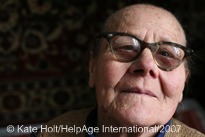 The Vienna International Plan of Action on Ageing is the first international instrument on ageing, guiding thinking and the formulation of policies and programmes on ageing. It was endorsed by the United Nations General Assembly in 1982 (resolution 37/51), having been adopted earlier the same year at the World Assembly on Ageing at Vienna, Austria. It is sometimes known as the 'Vienna Plan' in honour of its city of origin. More frequently, however, it is referred to as the 'International Plan', underscoring its relevance for all world regions.
The Vienna International Plan of Action on Ageing is the first international instrument on ageing, guiding thinking and the formulation of policies and programmes on ageing. It was endorsed by the United Nations General Assembly in 1982 (resolution 37/51), having been adopted earlier the same year at the World Assembly on Ageing at Vienna, Austria. It is sometimes known as the 'Vienna Plan' in honour of its city of origin. More frequently, however, it is referred to as the 'International Plan', underscoring its relevance for all world regions.
It aims to strengthen the capacities of Governments and civil society to deal effectively with the ageing of populations and to address the developmental potential and dependency needs of older persons. It promotes regional and international cooperation. It includes 62 recommendations for action addressing research, data collection and analysis, training and education as well as the following sectoral areas:
- health and nutrition
- protection of elderly consumers
- housing and environment
- family
- social welfare
- income security and employment
- education
The Plan is part of an international framework of standards and strategies developed by the international community in recent decades. It should, therefore, be considered in relation to agreed standards and strategies in the areas of human rights, advancement of women, families, population, youth, disabled persons, sustainable development, welfare, health, housing, income security and employment, and education.
 Welcome to the United Nations
Welcome to the United Nations